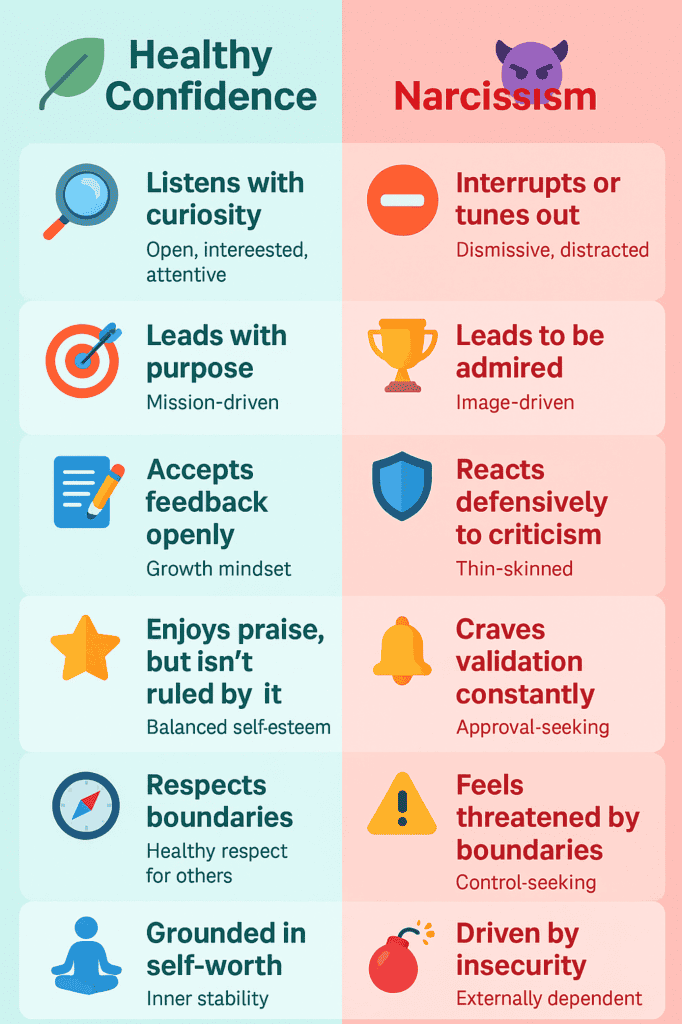You’ve worked hard to build confidence. But lately… you’re wondering:
Am I self-assured… or just self-absorbed?
It’s a question I’ve asked myself more than once, especially after cutting ties with some of my family members who always called me “too much.” Too proud. Too distant. Too full of myself.
But I remember how small I used to feel in that household.
How invisible I became when I didn’t play the role they wanted.
The truth is, real confidence and narcissism can wear similar faces.
They can both speak boldly, take up space, and say “no” without apology.
But one comes from self-connection. The other is just armor.
I’ve spent years untangling that difference. Not just by reading or learning, but by sitting with my own scars.
Noticing the shifts in my energy when I’m grounded… versus when I’m defending myself without realizing it.
This isn’t a personality test; it’s a clarity map. Let’s break it down.
Table of Contents
Confidence and Narcissism Can Look Alike At First

Both Speak Boldly, But One Listens
I used to think being quiet made me likable, especially around my narcissist mother.
She took up every inch of emotional space, and the only way to keep the peace was to stay small and agreeable.
So when I started speaking up as an adult, I was terrified that I sounded just like her.
Overpowering, dismissive, self-important.
But over time, I noticed something she never did: I listened. I asked questions. I cared how people felt after talking to me.
My mom, on the other hand, didn’t listen. She waited for her turn to speak, and if she didn’t like what you said, she’d twist it or shut it down entirely.
Confidence speaks with conviction, but it makes room for others. Narcissism doesn’t. It speaks to dominate.
And once I saw that clearly, I stopped second-guessing my voice.
Both Can Lead, But For Different Reasons
It took me years to step into leadership in my own life… to run projects, manage teams, and make decisions without shrinking.
And still, I’d hear echoes of my narcissistic sister’s accusations: “You just want control. You always think you’re better than everyone.”
But confidence isn’t about being above anyone.
I lead because I believe in what I’m building… because I care deeply about doing things with intention.
My toxic sister, much like my mom, wanted leadership only when it came with admiration. She needed to be seen as superior.
That’s the difference.
Confidence leads to serving a purpose. Narcissism leads to serving an ego.
Key Differences That Reveal What’s Underneath

Feedback Doesn’t Feel Like an Attack
A few years ago, one of my cousins gently pointed out that I sometimes over-explain myself in any situation I’m in.
She meant well, and she said it with kindness, but I still felt that old twinge in my stomach.
Not because I was offended, but because I was used to criticism being weaponized, especially by my narcissistic mother.
Growing up, feedback was never feedback. It was humiliation. It was personal. So I had to rewire how I heard it.
Now, I pause. I ask myself, “Is this helping me grow?” If it is, I take it in.
That’s the power of confidence; it creates room for refinement. Narcissism, on the other hand, sees critique as a threat.
My mom once refused to speak to a relative for weeks just because they disagreed with her in public.
Confidence welcomes growth. Narcissism punishes honesty.
Validation Is a Bonus, Not a Need
I used to light up when my mom complimented me. It happened rarely, so when it did, I clung to it like proof that maybe I was finally enough.
But her approval was always temporary… and conditional. One minute she’d praise me, the next she’d compare me to my older sister.
It took years to realize that my worth couldn’t depend on someone so unstable.
These days, validation feels nice, but it’s not oxygen.
I appreciate support, but I don’t chase it.
My mom, sister, and even my brother crumble without attention.
They constantly need others to reflect back a perfect image, or they fall apart.
That’s the difference. Confidence is whole without applause. Narcissism is nothing without it.
Boundaries Are Respected, Not Resented

When I started setting boundaries with my older sister, not answering calls when she was yelling, not engaging when she tried to provoke me, she told the family I was “cold” and “disrespectful.”
That’s how narcissists respond to limits: as rejection.
But confidence has nothing to prove.
When my cousin needed space during a tough season, I didn’t take it personally. I understood. I supported her from a distance.
That’s what healthy people do. They respect the emotional fence, even if it’s temporary.
Narcissism takes limits as a personal attack. Confidence honors them without drama.

What Fuels Narcissism (and What Doesn’t)?

The Perception Gap
My mom always needed to be seen as the matriarch. Elegant, intelligent, endlessly respected.
She had this image she worked hard to project, and to outsiders, it often worked.
But behind closed doors, any slight disagreement felt like a personal attack. She’d sulk for days or lash out with cutting words.
That’s the core of narcissism: an inflated image built on shaky ground.
It looks like self-confidence, but the moment reality pushes back, it collapses. It’s not a strength. It’s fear in disguise.
Confidence, on the other hand, doesn’t come from image.
It comes from work. Years of unlearning, healing, and choosing truth over performance.
My confidence wasn’t handed to me; I built it by standing up to people who once silenced me.
There’s no performance in that. Just growth.
The Rejection Loop
Narcissists often create their own pain. I’ve seen it up close.
My older sister always felt like she wasn’t truly accepted in the family, and instead of working through those feelings, she became bitter.
The more she acted out, the more people pulled away.
And the more they pulled away, the more she felt rejected… and the more vicious she became.
It’s a loop. A painful one.
I’ve been excluded too, especially after choosing to walk away from my mom and siblings.
But I’ve learned that not being liked doesn’t mean I’m not worthy.
My value isn’t up for debate just because someone doesn’t approve of my boundaries.
That’s the difference. Narcissism demands inclusion, then punishes people for not offering it.
Confidence recognizes that not everyone will stay, and doesn’t fall apart because of it.
The Most Overlooked Trait of Real Confidence

Empathy. It’s the quiet strength that separates confidence from narcissism.
Not just understanding others, but valuing their perspective, even when it doesn’t match your own.
I didn’t fully grasp that until I saw the opposite so clearly in my own family.
My narcissistic brother rarely asked how I was doing, even during some of the hardest moments in my life.
If I opened up, he’d change the subject or minimize what I said.
My pain made him uncomfortable. My truth challenged the version of the family he wanted to believe in.
My mom did the same. There was never space for my feelings, only hers.
She could talk for hours about her suffering, but shut down if anyone else had needs.
It was always about her.
There’s actually research backing this up.
One study found that people with narcissistic traits often understand what others are going through, but they don’t feel it.
Their emotional empathy is impaired, even if their intellectual empathy remains intact. And when I read that, something clicked.
That’s why I always felt so unseen, even when I explained myself clearly. They could hear me, but they couldn’t feel me.
Real confidence isn’t loud. It listens. It makes space. It doesn’t need to be the center of every room, because it knows its worth isn’t at risk by letting others matter too.
Empathy is the quiet trait that narcissism can’t fake. And confidence doesn’t need to perform.
Are You Worried You Might Be Narcissistic?

If you’re asking that question, you’re likely not.
Narcissists don’t reflect, they deflect.
They don’t lose sleep wondering if they’ve hurt someone. They rewrite the story to make themselves the victim.
I’ve had those moments of self-doubt, especially after going no-contact with my mom and siblings.
I used to wonder if I was being cold. If I was the problem. If walking away made me cruel.
But over time, I saw it more clearly: my distance wasn’t about ego, it was about survival.
That hyper-independence I carried for years? It was never arrogance. It was protection.
Same with overachieving. Same with trying to keep the peace, even when I was breaking inside.
These aren’t signs of narcissism. They’re signs of trauma.
And healing doesn’t turn you into a narcissist, it reveals who you were before the damage.
So if you’re asking yourself these hard questions, hold compassion.
The very act of wondering means you care.
And that’s the furthest thing from narcissism.
Know The Difference. Choose Your Path.
Confidence is calm. Narcissism is chaos in a crown.
I’ve lived on both sides of the line, not because I was narcissistic, but because I was raised in it.
I know what it’s like to mistake silence for strength, or overachievement for self-worth.
I know how easy it is to confuse self-protection with self-importance when you’ve had to fight to be seen.
But real confidence doesn’t need a spotlight. It doesn’t dominate the room, twist the narrative, or punish people for setting boundaries.
It stands steady.
You don’t have to prove your worth, just protect your peace.
Know the line. Choose your side.
Related Posts:
- Experts Say 1 in 6 Are Narcissists: Are You One?
- 5 Surprising Brain Discoveries That Finally Explain Narcissists (And It Explains A Lot)
- 5 Confessions of a Narcissist: Behind The Mask
- Why Narcissists Are Like Babies (And Why That Realization Will Set You Free)
- This Is Why Narcissists Act Like They Don’t Understand, When They Clearly Do!


